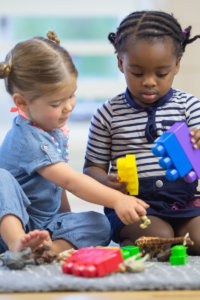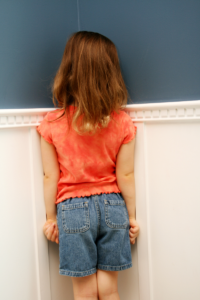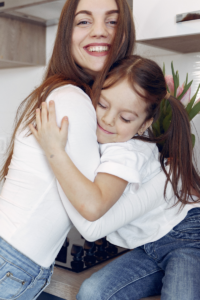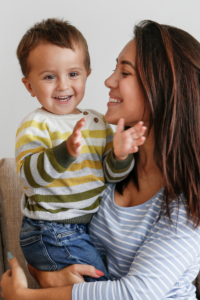Why Positive Discipline is The Key: Raising Respectful, Confident Kids Without Punishment
Updated June 2024

Imagine this common scenario: your young child is playing with a friend, until that friend grabs a toy out of their hand. Your child, distressed and upset, hits their friend in anger. You’re horrified that your child would resort to this, and triggered by this outburst. So, in the moment, giving your child a timeout or some other punishment might seem like the quickest solution, but is it the best?
Here’s the truth: there is a better way! Positive discipline offers a transformative approach. It guides your child, with respect, empathy, and kindness, to embrace positive behaviors. This isn’t about control; it’s about strengthening your precious bond while nurturing your child’s development.
Instead of isolating children with punishment, positive discipline empowers them to make good choices. This blog post will explore why positive discipline is not only more effective, but also better for both you and your child. We’ll delve into the benefits of this approach and show you exactly how it works.
Traditional Methods: A Familiar, Frustrating Cycle

We’ve all been there. Timeouts, punishments, and raised voices – these traditional parenting methods were likely used on us when we were growing up. They can feel like the only tools in our toolbox when our child misbehaves.
But let’s consider the effectiveness.
Think back to a time when your parent yelled “Go to your room!” or “You’re in time out!” Did you sit there contemplating why hitting your friend was wrong? Or were you stewing and steaming about how unfair it was that you were being punished when your friend stole the toy out of your hand?
Sure, the timeout might have stopped the immediate hitting – which is important. But it didn’t do anything more than that. Punishments don’t address the root cause of the behavior, providing guidance or alternatives, or preventing future hitting. Positive discipline, on the other hand, prioritizes understanding and connection, creating a more lasting impact on your child’s behavior and strengthening your bond.
Here’s Why Traditional Discipline Doesn’t Work

1. Focus on Control, Not Learning:
Traditional methods prioritize immediate obedience over teaching valuable life skills. Children might learn to avoid punishment, but not necessarily why their actions were wrong or how to make better choices.
For example, let’s say your child throws a tantrum in the grocery store. While yelling or a timeout might stop the tantrum in the moment, it doesn’t teach them why their behavior is disruptive or how to manage their emotions effectively. They don’t learn or understand the impact of their actions.
2. Breeds Negative Emotions:
Punishments can make children feel ashamed, frustrated, and angry. This can lead to negative coping mechanisms like lying (“I didn’t take your cookie!”) or sneaking (“Don’t tell my mom!”) to avoid getting in trouble. These behaviors ultimately damage trust and open communication with you, the parent they should feel safe talking to.
3. Short-Term Compliance, Not Long-Term Change:
Children might comply in the moment to avoid punishment, but they don’t learn the reasons behind the rules. This makes it difficult for them to make positive choices independently when parental supervision isn’t present.
Let’s say your child hits their sibling. Taking away a favorite toy might stop them from hitting in that moment, but it doesn’t teach them how to resolve conflict in a healthy way. Without understanding the ‘why’ behind the rule, they’re more likely to repeat the behavior when the pressure is on and you’re not there to supervise.
4. Silence the Inner Voice:
Demanding obedience can lead children to disconnect from their instincts. They might stop listening to their own sense of right and wrong, fearing authority figures instead of developing self-control and critical thinking skills. They might stop speaking up because they believe their voice won’t be heard.

5. Erodes Trust and Connection:
Punishment creates a power struggle between parent and child. This can make them feel isolated and hesitant to approach you with problems. Instead of a safe space for learning and open communication, the parent-child relationship becomes strained, hindering their overall development and emotional well-being.
But despite all of this, research and experience have shown us there is a better way. Positive discipline offers a transformative approach that focuses on fostering positive behavior development, building trust, and empowering children to make responsible choices.
Understanding Positive Discipline:
Positive discipline goes beyond simply demanding obedience. It prioritizes teaching and guiding children to develop the skills they need to independently make positive choices. This doesn’t mean rewarding or ignoring misbehavior. Instead, it involves setting clear and consistent expectations and then working collaboratively with your child to help them meet those expectations.
Positive discipline focuses on nurturing a child’s overall development by fostering a strong parent-child bond built on trust, empathy, and open communication. It is rooted in positive parenting philosophies.
Here are the core principles that form the foundation of positive discipline:
Mutual Respect:
Positive discipline prioritizes building a relationship based on trust, empathy, and open communication. This means treating your child with respect, even when they’ve made a mistake. By listening to their feelings and perspectives, you create a safe space where they feel comfortable expressing themselves.

Understanding, Not Punishment:
The goal of positive discipline isn’t to punish mistakes, but to help children understand the natural consequences of their actions. This could involve explaining how their behavior affects others or allowing them to experience the logical outcomes of their choices. For example, if they refuse to wear a jacket on a cold day, they might experience feeling chilly. Positive discipline encourages learning from mistakes rather than fearing punishment.
Guidance & Support:
Positive discipline equips children with the tools and support they need to make positive choices and develop self-control. This involves setting clear and consistent boundaries, offering age-appropriate choices, and providing positive reinforcement for good behavior. By guiding children through challenges and celebrating their successes, you empower them to become responsible and confident individuals.
Why Choose Positive Discipline?
Embracing positive discipline might seem like a leap, but the rewards for both you and your child are undeniable. It’s a shift from a power struggle to a collaborative partnership, fostering a more peaceful and joyful parenting experience. Here’s a closer look at the benefits:
For Parents:
- Reduced Stress and Frustration: Positive discipline equips you with effective tools to navigate challenging situations calmly and confidently. This leads to less stress, allowing you to enjoy precious moments with your child.
- Stronger Parent-Child Bond: Positive discipline fosters trust, empathy, and open communication. It creates a safe space where your child feels comfortable expressing themselves and coming to you with problems. This strengthens your bond and builds a foundation for a lifelong, supportive relationship.
- Sense of Partnership with Your Child: Positive discipline involves working together to find solutions and make positive choices. This collaborative approach empowers your child and fosters a sense of responsibility within the family unit. You become a team, working towards shared goals.

For Children:
- Increased Self-Confidence: When children understand the “why” behind expectations, they feel empowered to make positive choices independently. Positive discipline celebrates their successes and encourages them to learn from mistakes, boosting their self-confidence and sense of accomplishment.
- Stronger Sense of Responsibility: Instead of simply fearing punishment, positive discipline helps children develop a strong sense of responsibility for their actions. They learn to consider the consequences of their choices and take ownership of their behavior.
- Improved Problem-Solving Skills: Positive discipline focuses on guiding children through challenges and encouraging them to find solutions. This equips them with valuable problem-solving skills that will benefit them throughout their lives.
- Greater Empathy for Others: Positive discipline fosters empathy by helping children understand how their actions affect others. They learn to consider different perspectives and develop compassion for their peers.
Positive discipline might require an initial adjustment, but the positive impacts on both you and your child are far-reaching and long-lasting. It’s an investment in your child’s future and a path towards a more peaceful and fulfilling parenting experience.
I want to take a moment to recognize that embracing positive discipline can be a significant and challenging transition, especially for parents who weren’t raised with this approach. Shifting from relying on punishments to fostering understanding can require courage and commitment. However, you are laying the foundation for a stronger parent-child bond, a more confident child, and a more peaceful home. I applaud you for being here and taking this important step!
Building a Brighter Future with Positive Discipline
Positive discipline isn’t a magic bullet, but it offers a powerful alternative to traditional parenting methods. By prioritizing understanding, guidance, and building a strong parent-child bond, you’re empowering your child to become a confident, responsible, and empathetic individual. It’s a journey of growth for both you and your child, requiring patience and commitment, but the rewards are truly significant.
Ready to Embrace the Journey?
This blog post has just scratched the surface of positive discipline. Learn exactly how to incorporate positive discipline here. And don’t forget to be patient with yourself and your child.
READY TO UNLOCK THE SECRETS OF POSITIVE PARENTING AND TURN TANTRUMS INTO TEAMWORK?
- Download your FREE guide: The Power of Positive Parenting
- Explore the transformative resources in my Positive Parenting shop!
- Follow me on Instagram @ThatQuietMom for daily parenting tips and tricks!





